Yes, faxed documents are generally considered legally binding in the United States and many other countries. While it might seem outdated, this technology remains trusted in legal, medical, and financial fields because foundational laws give faxed signatures the same legal weight as traditional “wet ink” signatures.
The Legal Foundation for Fax Documents
When courts evaluate whether faxes are legally binding, they focus on two simple questions: did both parties intend to enter into an agreement, and can the document be authenticated? A fax naturally creates a clear, traceable record of transmission—powerful evidence that holds up well in legal proceedings.
In the U.S., fax enforceability is built on key legislation. The Electronic Signatures in Global and National Commerce Act (ESIGN) sets national standards, while most states follow the Uniform Electronic Transactions Act (UETA). Together, these laws make electronic records and signatures—including faxed ones—just as enforceable as paper documents, provided all parties agree to conduct business electronically.
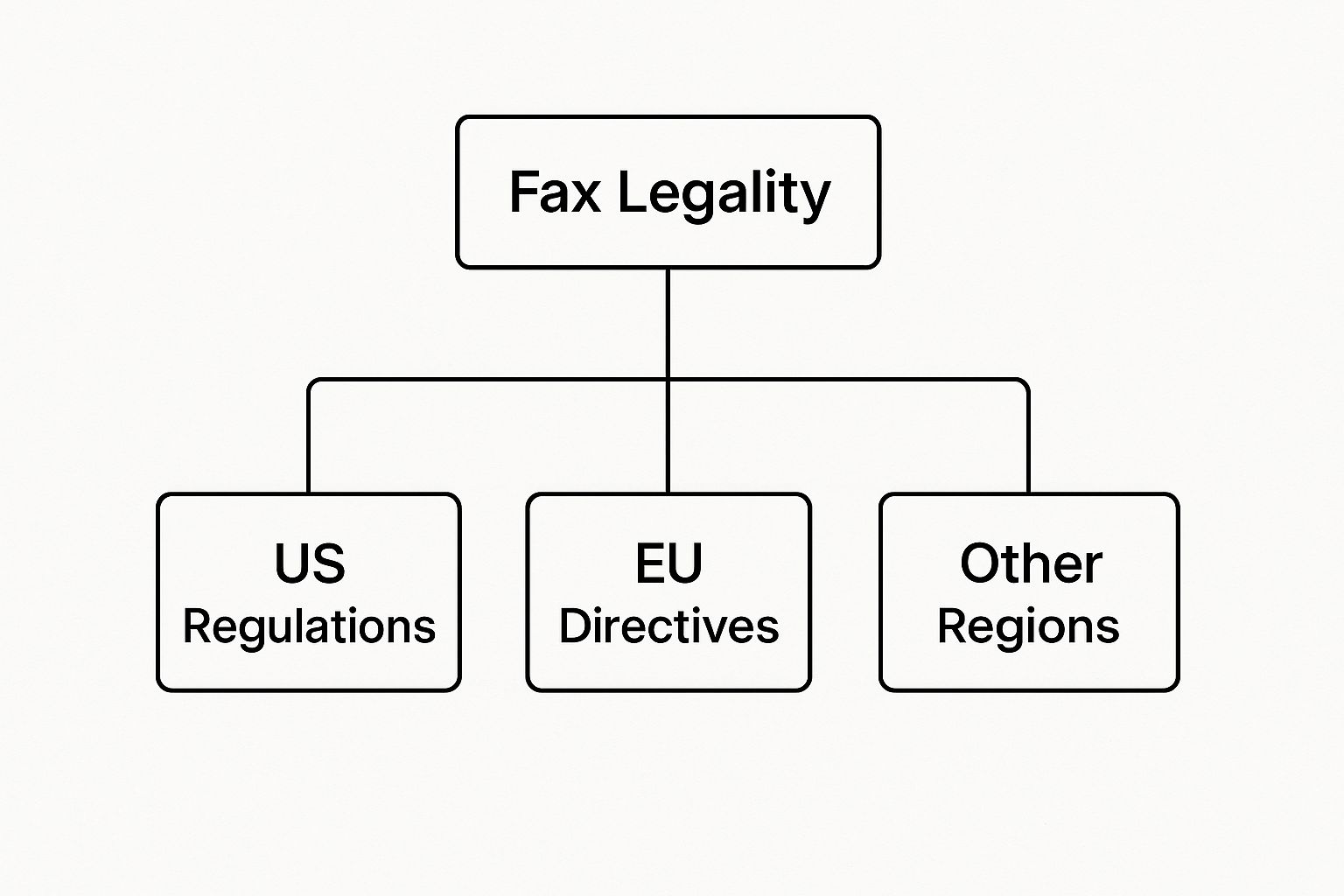
The real legal test isn’t about the technology you use; it’s about intent. A faxed signature clearly signals that a person intends to be bound by the document’s terms.
Key Requirements for Enforceable Faxes
Several factors determine whether a fax meets legal standards:
Intent and Authentication: The signature must show clear intention to agree to the document’s terms, and it must be possible to verify the signature belongs to the claimed person.
Document Integrity: The received document must be an exact, unaltered copy of what was sent. Any changes, smudges, or missing pages could invalidate the agreement.
Consent for Electronic Transactions: All parties must agree to conduct business electronically. Using a fax to respond to an offer is often considered implied consent.
Verifiable Transmission: A transmission report should be available proving the document was successfully sent and received.
How Fax Transmission Creates Legal Evidence
One of the strongest arguments for fax validity is the comprehensive audit trail it automatically creates. Every fax generates a transmission confirmation report—powerful evidence that’s difficult to dispute. Understanding how to verify your fax was received ensures you have the documentation needed for legal purposes.
This detailed confirmation report typically includes:
- Sender’s and recipient’s fax numbers
- Date and time of transmission
- Connection duration and number of pages sent
- Transmission status (successful or failed)
This automated record-keeping acts as third-party verification from the phone company, confirming a connection was made between two specific numbers at a precise time. This makes it extremely difficult for someone to claim they never received the document.
When you send a fax online through modern services, you get even stronger evidence through comprehensive digital logs that are easily searchable and permanently stored.
PayPerFax Makes Confirmation Simple
With PayPerFax, confirming your important faxes is straightforward and automatic. After sending your fax, you’ll immediately see a confirmation status on your tracking page showing whether transmission was successful. You’ll also receive a detailed confirmation email with all the transmission details—recipient number, timestamp, page count, and delivery status. This creates a complete digital paper trail that’s perfect for legal documentation, with no risk of losing physical confirmation slips or dealing with unclear LCD displays from traditional fax machines.
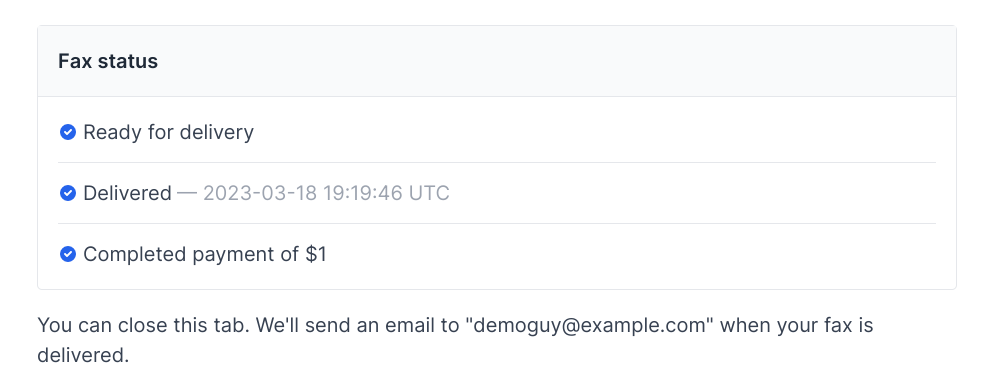
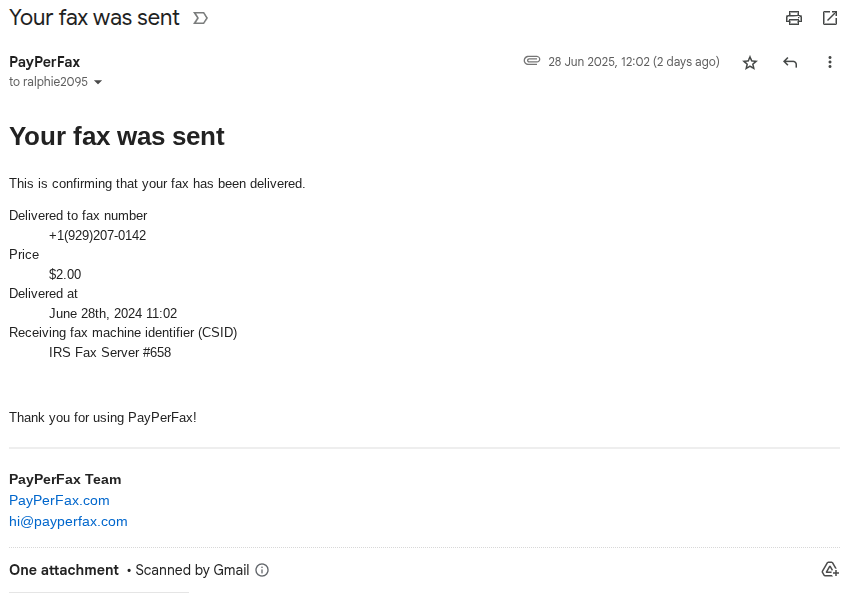
International Recognition of Faxed Documents
The principles that make faxes valid in the U.S. are recognized in many developed countries. Major trading partners like the United Kingdom, Canada, and Australia have electronic transaction laws following similar logic to America’s legislation.
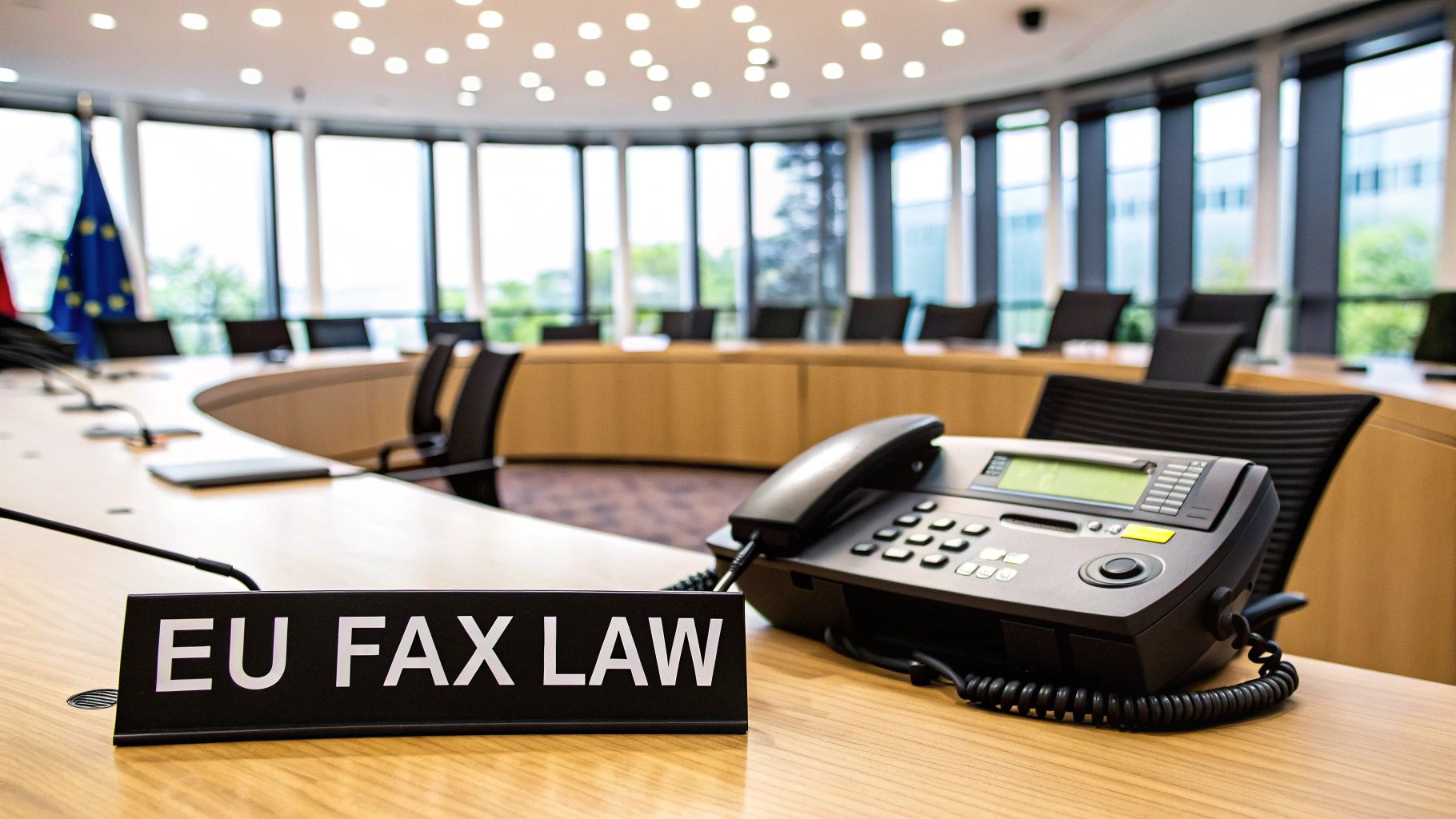
These international laws stand on three key pillars: authenticity, integrity, and non-repudiation. If you can prove who sent the document, show it wasn’t altered in transit, and confirm successful delivery, a fax is almost always accepted as legitimate.
The UK legal system particularly values the built-in traceability of fax transmissions. From London to Sydney, the legal consensus is clear: the delivery method matters less than the evidence it creates.
Best Practices for Legally Sound Faxes
Creating an enforceable fax requires attention to detail. Think of each fax as building a small legal case—you need enough evidence to prove a specific document was sent, received, and agreed upon.
Always use a detailed cover sheet that includes sender information (name, company, contact details), recipient information (name, title, company), transmission details (date and total pages), and a confidentiality notice for sensitive information.
Keep comprehensive records of every transmission. Learn more about different types of fax confirmations to ensure you’re capturing the right evidence. File confirmation reports with a copy of the faxed document itself.
Ensure document clarity by sending complete and legible documents. Poor quality transmissions can easily be challenged, as recipients could argue they couldn’t read the terms.
For high-stakes documents, consider using online fax services that provide automatic digital archives and simplified document handling. When dealing with notarized documents, proper handling becomes even more important since the notary’s seal verifies the signer’s identity.
Compliance Considerations and Limitations
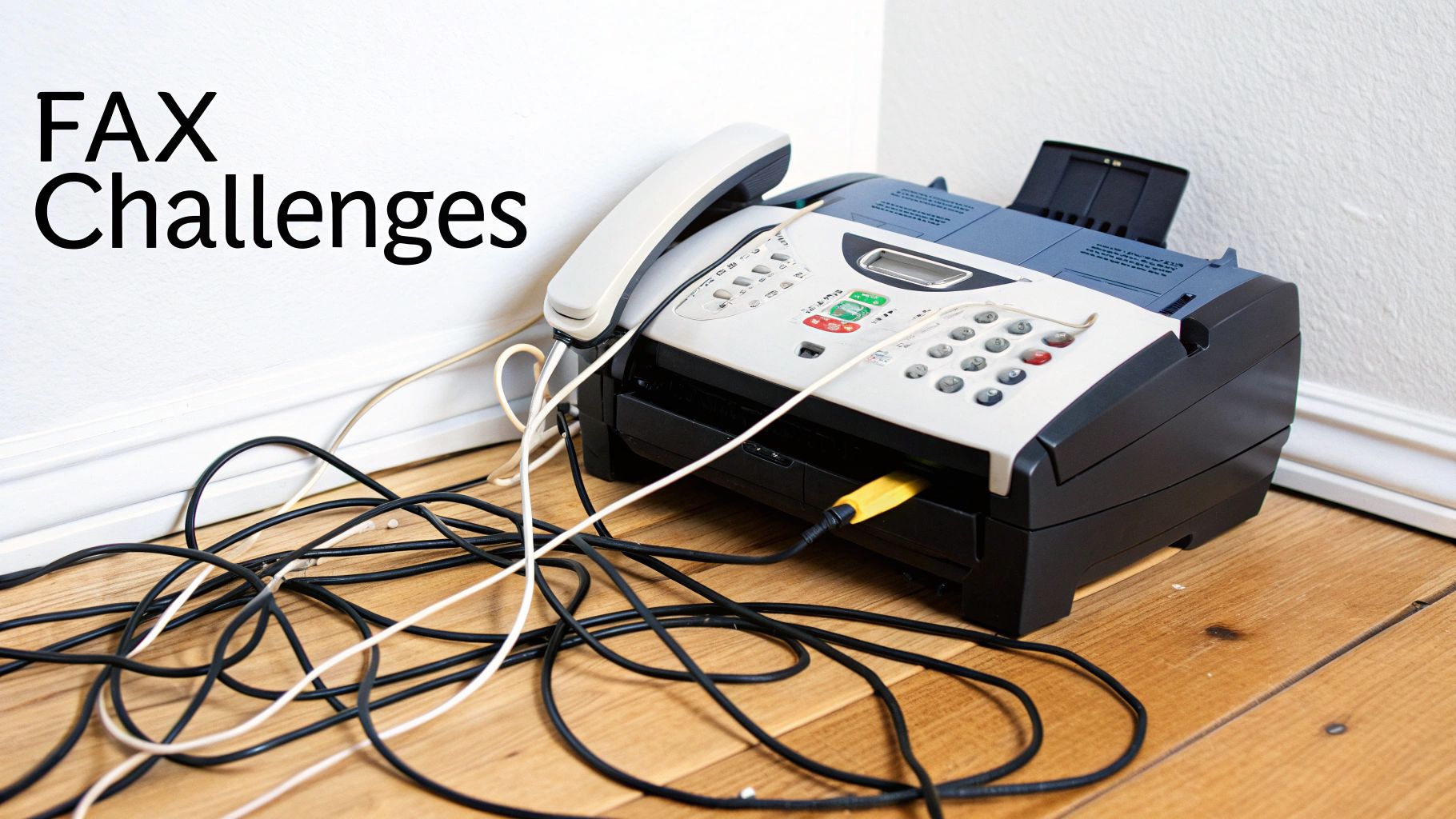
While the federal laws give faxes broad acceptance, some documents are specifically excluded and require traditional “wet ink” signatures. These exceptions often include wills and testamentary trusts, court orders and official court documents, certain real estate deeds, and notices for utility cancellation or foreclosure.
Marketing fax compliance is governed by the Telephone Consumer Protection Act (TCPA), which strictly regulates unsolicited fax advertisements. Violations can result in fines starting at $500 per unsolicited page sent. Always ensure you have an established business relationship or explicit consent before sending marketing faxes.
Industry-specific requirements apply in healthcare and finance. HIPAA compliance requires verification of recipient fax numbers, mandatory confidentiality cover sheets, and secure fax machine locations.
Frequently Asked Questions
Is an online fax more legally binding than a traditional fax? No, both have equal validity. However, online fax services provide better evidence through automatic digital archives and detailed logs, making them easier to defend in disputes.
What if a fax transmission is unclear or incomplete? An unreadable fax is invalid. If you receive a poor quality fax, treat it as if you never received it. Request a clear, complete resend and verify your fax confirmation to ensure successful transmission before considering the document delivered.
Are faxes admissible as evidence in court? Yes, faxes are commonly admitted as evidence. The confirmation report provides stronger authentication than emails that could be falsified.
Should I keep the original document after faxing? Always keep the original with the “wet ink” signature as your ultimate backup. While the faxed copy is sufficient for most purposes, the original provides irrefutable proof if the signature is ever questioned.
Can I fax documents for official government business? Many government agencies accept faxed forms and applications. Check specific agency requirements, as some may have particular formatting or cover sheet requirements for processing.
Making Your Faxes Legally Bulletproof
Understanding that faxes are valid is the first step. Creating faxes that will actually hold up under scrutiny requires following proven practices: use detailed cover sheets, maintain comprehensive records, ensure document clarity, and leverage modern faxing technology for stronger evidence trails.
When you need to send legally important documents without the hassle of maintaining a fax machine or monthly subscription, modern online fax services provide the perfect solution. You get all the legal protection of traditional faxing with the convenience and enhanced record-keeping of digital technology.
Need to send a legally sound fax right now? PayPerFax lets you send faxes globally from any device, paying only for successful transmissions—no subscription required, no charges for failed faxes.